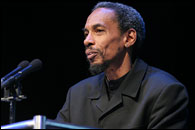Chief Servant Butler
A labour leader in Trinidad and Tobago. He is best known for leading a series of labour riots between June 19 and July 6, 1937 and for forming a series of personalist political parties that focused its platform on the improvement of the working class.
Chief Servant Butler first came to prominence in 1935 when he led a "hunger march" from the oilfields to Port of Spain. In 1936 he was expelled from the Trinidad Labour Party for his "extremist tendencies". He then formed the British Empire Citizens' and Workers' Home Rule Party. On June 19 1937, a strike in protest of working conditions, wages, racism and exploitation began in the oilfields in the southern Trinidad. Police attempted to arrest Butler as he addressed a meeting in Fyzabad.
His supporters prevented the police from doing so and Charlie King, a policeman was killed. The Labour riots of 1937 resulted in turmoil throughout the oilfields. When strikes spread to the sugar factories, the Colonial government responded by issuing an arrest warrant for Butler. Butler went into hiding and the colonial authorities were unable to locate him. He stayed in contact with the authorities through Adrian Cola Rienzi and although he was promised safe passage by the colonial authorities to testify at a commission of enquiry into the events of June 1937, he was arrested by the colonial government when he emerged to do so.
Butler was detained by the colonial authorities from September 9, 1937 to May 1939. With the outbreak of World War II in September, 1939, Butler was re-arrested and imprisoned for the duration of the war. After release from prison Butler formed the Butler Home Rule Party, which later became the Butler Party. The Butler Party which captured the largest block of seats in the Legislative Council, but the Governor chose to exclude Butler and instead a favoured mulatto named Albert Gomes became the first Chief Minister.
In the 1956 General Elections the Butler Party only won two seats. Butler, hero of the Afro-Trinidadian working class was effectively dispossessed by Eric Williams and the People's National Movement.
Butler is looked upon as the founding father of the Oilfields Workers' Trade Union (OWTU) and the labour movement and is honoured with a statue in Fyzabad. He was awarded the Trinity Cross, the nation's highest honour, in 1970.
BUTLERS POLITICAL PARTIES----------------------
After he was released from prison at the end of the war, Butler re-organised the British Empire Citizens' and Workers' Home Rule Party to fight the 1946 General Elections. The party won three of the nine available seats on the Legislative Council. In the 1950_General_Elections the Butler Home Rule Party won seven of the eighteen available seats. Although the party secured a plurality of elected seats in the Legislative Council, the British government feared Butler as a radical and instead asked the other Independent members to form the government. Consequently, Albert Gomes was the first Chief Minister and not Butler.
The Butler Party won two of the 24 seats in the 1956_General_Elections, and two of 72 seats in the 1959 County Council Elections, but won no seats thereafter. The 1966 General Elections was the last one contested by the party. Butler died in 1977.


0 Comments:
Post a Comment
<< Home